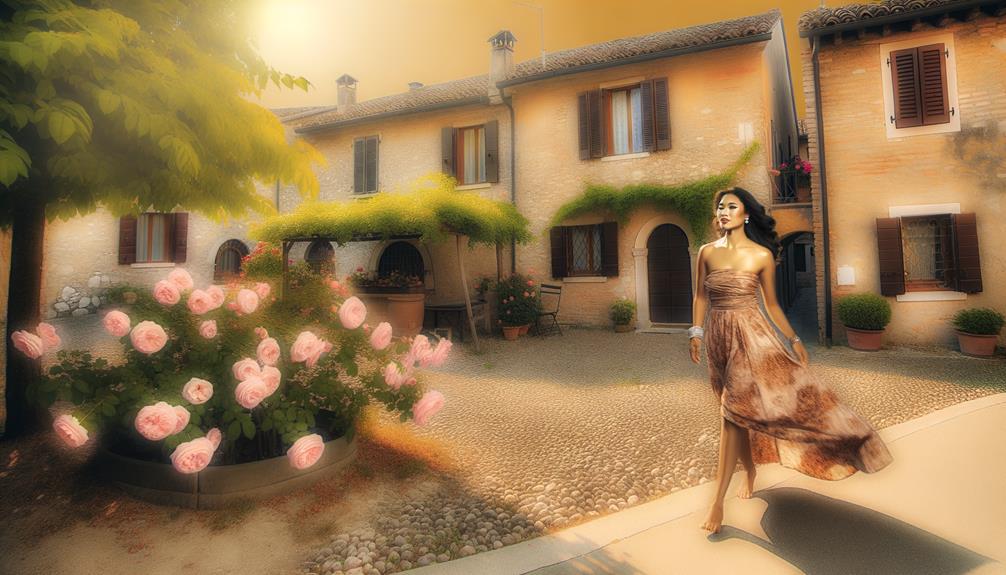Beatrice Name Meaning and Origin
The name Beatrice traces its roots to the Latin 'Beatrix', which means 'bringer of joy' or 'blessed'. Stemming from 'beatus', signifying blessedness, and the feminine suffix '-trix', this name epitomizes a state of divine favor.
Historically, it is associated with European royalty and literary significance, notably in Dante's 'Divine Comedy', where Beatrice symbolizes idealized love and divine wisdom. The name's timeless appeal is evident in its adaptability across languages and cultures.
Today, Beatrice enjoys revived popularity, resonating with both historical gravitas and modern cultural trends. Exploring further will reveal its multi-faceted legacy.

Key Takeaways
- Beatrice originates from the Latin name 'Beatrix,' meaning 'bringer of joy.'
- The name derives from 'beatus,' which means 'blessed' or 'happy.'
- Historically associated with European royalty and noblewomen.
- Immortalized in Dante Alighieri's 'Divine Comedy' as a symbol of idealized love and virtue.
- The name has variants in Italian, Spanish, French, English, and Slavic languages.
Etymology and Meaning
The name Beatrice originates from the Latin name 'Beatrix,' which is derived from 'beatus,' meaning 'blessed' or 'happy.' In its etymological roots, 'beatus' signifies a state of blessedness or divine favor, reflecting a positive connotation. In many cultures, the name Beatrice has been associated with purity, virtue, and grace. It has been a popular name throughout history, with several notable figures bearing the name. The meaning of the name Evelyn, on the other hand, is derived from the Old French name Aveline, which means “desired” or “wished for.
The suffix '-trix' is a feminine agentive suffix in Latin, indicating a female bearer of the blessed or joyous state. This name has permeated various cultures and languages, maintaining its core meaning while adapting phonetically.
Over time, Beatrice has evolved in pronunciation and spelling, yet consistently conveys notions of happiness and blessedness. Its enduring appeal is partly due to its melodious sound and the positive attributes it signifies, making it a favorable choice for naming across generations.
Historical Significance
Beatrice's historical significance is deeply intertwined with its use among European royalty and its association with literary works from the Middle Ages to the Renaissance. The name Beatrice has been borne by numerous queens, princesses, and noblewomen, reinforcing its status as a symbol of nobility and grace. Linguistically, the name derives from the Latin "Beatrix," meaning "bringer of joy," a sentiment that resonated in medieval Christian contexts. This name's prominence in historical records is evident in its frequent appearance in chronicles and genealogies of European aristocracy.
| Period | Notable Figure |
|---|---|
| Middle Ages | Beatrice of Castile |
| Renaissance | Beatrice d'Este |
| 19th Century | Princess Beatrice |
| Contemporary Era | Beatrice of York |
This historical context underscores Beatrice's enduring legacy.
Beatrice in Literature
Renowned across various literary traditions, Beatrice has been immortalized as a symbol of idealized love and virtue, most distinguishedly in Dante Alighieri's 'Divine Comedy'.
In this seminal work, Beatrice serves as both muse and guide, embodying divine wisdom and grace, which she imparts during Dante's journey through Paradise. Her name, derived from the Latin 'Beatrix', meaning 'she who brings happiness,' underscores her role as a source of spiritual enlightenment.
Dante's portrayal of Beatrice is deeply rooted in courtly love traditions, where she transcends earthly existence to represent celestial purity. This literary depiction has cemented Beatrice's place in the canon as an archetype of unattainable, yet profoundly influential, feminine ideal.
Cultural Variations
Exploring the cultural variations of the name Beatrice reveals its rich tapestry of meanings and adaptations across different languages and historical periods.
Originating from the Latin 'Beatrix,' meaning 'bringer of joy,' the name has proliferated through various cultures.
In Italian and Spanish, 'Beatrice' and 'Beatriz' respectively have maintained similar pronunciations and connotations.
The French variant 'Béatrice' has been popular since the Middle Ages, often associated with nobility.
In English-speaking countries, the name gained prominence through literary works and royal usage.
Additionally, the Slavic rendition, 'Beatrica,' shows the name's adaptability in different linguistic contexts.
Each cultural adaptation retains the core essence of joy and blessing, demonstrating the name's enduring appeal.
Modern Popularity
In contemporary times, the name Beatrice has experienced a resurgence in popularity, influenced by its historical significance and continued cultural resonance.
This revival is partly attributable to its literary associations, notably in Dante Alighieri's 'Divine Comedy,' where Beatrice symbolizes divine love and guidance. The name's etymological roots in Latin—derived from 'Beatrix,' meaning 'she who brings happiness'—further enhance its appeal.
Additionally, modern media and celebrity culture have played a role in its renewed prominence, with remarkable figures opting for Beatrice for their children. This enduring name, which bridges classical elegance and contemporary charm, reflects a broader trend of reviving classic names that carry rich historical and linguistic heritage.
Consequently, Beatrice remains a favored choice in various cultural contexts.
Conclusion
To sum up, the name Beatrice, with its origins in Latin and its significance of 'bringer of joy,' has spanned centuries, embodying deep historical importance and literary eminence.
Across societies, its different versions mirror a mosaic of language diversity.
In contemporary times, its favor persists, resonating through the eras with a nearly unmatched depth.
The intricate etymological past and cultural influence of Beatrice highlight its enduring appeal and versatile existence in the records of naming.






